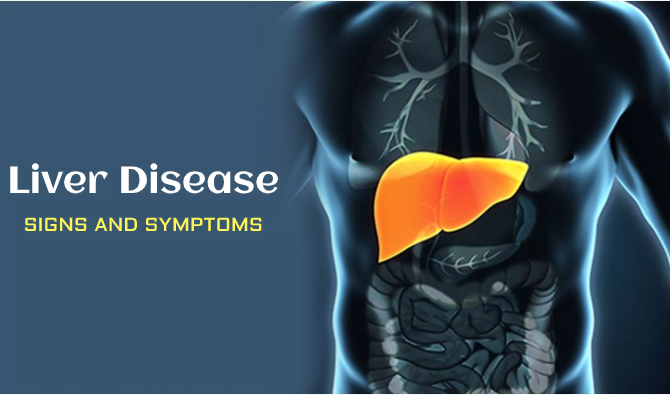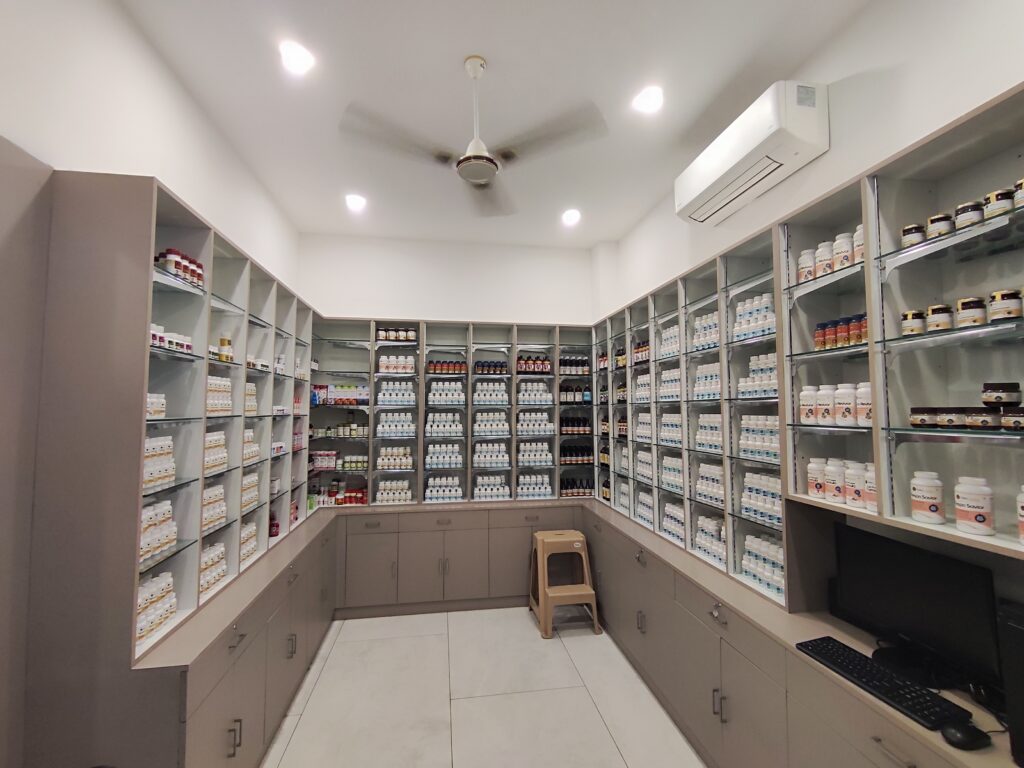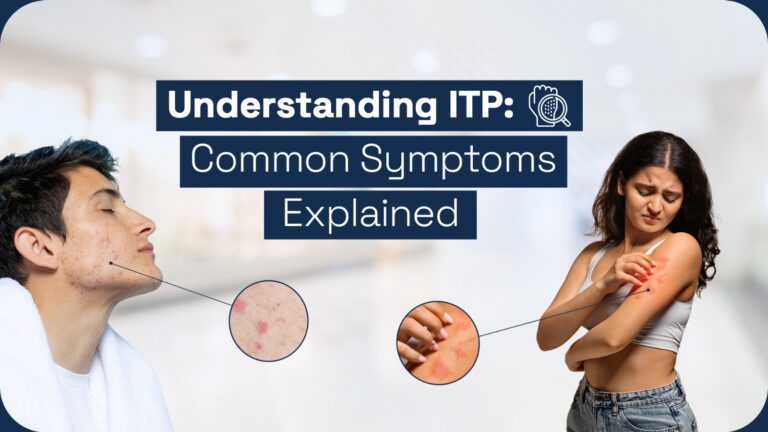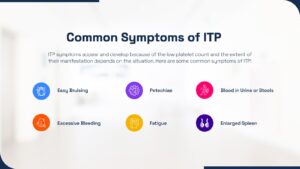Understanding Immune Thrombocytopenia (ITP)
Immune Thrombocytopenia also known as ITP is a medical condition where the volume of these platelets in the blood is low. Blood platelets are small particles in the blood that facilitate the clotting process to avoid the excessive bleeding. In ITP, the body frankly attacks these platelets and destroys them that in turn causes the various symptoms and possible repercussions.
ITP can be of two types depending on severity: the acute and chronic. Acute ITP mainly occurs in children and may be temporary, especially if it does not last more than a few months. Acute ITP is usually a temporary condition, hence, sometimes referred to as acute ITP, while chronic ITP may persist for years and mostly occurs in adults. It therefore means that comprehending ITP is characterized by defining and identifying its signs, knowing the causes of the illness and studying the possibilities for the treatment, including within the framework of Ayurveda.
Common Symptoms of ITP
ITP symptoms appear and develop because of the low platelet count and the extent of their manifestation depends on the situation. Here are some common symptoms of ITP:
Easy Bruising: This disease generally presents itself in patients who easily develop bruises with no apparent reason as to why this should be so. These might be deeper, more reddened, or more numerous than they have been in the past.
Petechiae: Petechiae, small red or purple pinprick hemorrhages are frequently observed in ITP patients. Such stations arise from hemorrhage beneath the skin.
Excessive Bleeding: It is typical to have frequent nosebleeds, bleeding gums, or prolonged bleeding from cuts and other minor injuries in ITP. This occurs due to considerable reduction in the clotting process of blood.
Fatigue: Small number of platelets as well as prolonged bleeding also causes one to feel fatigue, tired or weary. People can become very fatigued or weak.
Heavy Menstrual Periods: It is established that women with ITP may see their menstrual cycle thickening and lasting longer than usual, a scenario referred to as menorrhagia.
Blood in Urine or Stools: At times, bleeding can be in the internal organs such as the urinary system or gastrointestinal system resulting in hematuria or hematemesis respectively.
Enlarged Spleen: At times, the spleen may become enlarged and this causes discomfort or pain in the left upper abdomen.
Recognizing the Early Signs
Therefore, prompt identification with key features of ITP is very important so as to enhance the management process. Any new bruising, bleeding or any of the other symptoms mentioned above should thus be reported to a doctor. If it is diagnosed in the preliminary stage, then suitable treatment should be begun so as to avoid future problems.
Causes and Risk Factors
The exact cause of ITP is often unknown, but several factors may contribute to its development:
Autoimmune Reaction: Sometimes, ITP is a condition in which the human body produces antibodies that attack and destroy platelets.
Infections: Some known causes include Viral infections where one is likely to develop ITP. That is, its hormonal changes may alter the immunity status and trigger an immune attack against platelets.
Medications: Anticoagulant medications are among the medicines causing side effects which lead to low platelet levels in the blood. One should always consult a doctor regarding the prescribed drugs.
Genetics: Thus, genetic predisposition is not a rule for the development of ITP, yet it is also not rare.
Pregnancy: ITP can occur during pregnancy or it can also worsen during pregnancy. This condition is referred to as gestational ITP and commonly clears after the birth of the baby.
Diagnosing ITP
Diagnosing ITP involves a combination of medical history, physical examination, and laboratory tests:
Medical History: A doctor will go through a patient’s several critical symptoms, previous illnesses, and factors that may have precipitated the problem.
Physical Examination: The doctor may carry out tests to see if there are symptoms of blood clotting, certain bruises and enlargement of the spleen.
Blood Tests: Numerous biochemical tests are considered vital for confirming ITP. They test the count and volume of platelets as well as the other constituents of blood so that they can eliminate other illnesses.
Bone Marrow Biopsy: At times, a bone marrow test may be done to confirm the cause of low platelet count or to diagnose other blood related complications.
Ayurvedic Treatment Options for ITP
ITP is known to be treated in Ayurveda, the traditional system of medicine originated in India, with several management strategies. Modern Ayurvedic treatment covers concern with doshas and the general state of the body. Here are some Ayurvedic options for ITP:
Dietary Adjustments: According to the Ayurvedic system of medicine, proper diet helps in improving the production of platelets and overall well being of the body. The helpful foods are green vegetables, beet, vitamin C containing foods, whole foods to be erred on the side avoid are spicy foods, oily foods and processed foods.
Herbal Remedies: Ayurvedic herbs like Ashwagandha, Guduchi, and Amalaki may help improve immune function and support platelet health. These should be used under the guidance of an Ayurvedic practitioner.
Lifestyle Modifications: Incorporating practices such as yoga and meditation can help manage stress, which is important for overall well-being and may positively influence immune function.
Detoxification: Panchakarma, a detoxification therapy in Ayurveda, may help cleanse the body of toxins and improve overall health. This should be done under the supervision of a qualified practitioner.
Balancing Doshas: Ayurvedic treatment aims to balance the doshas. For ITP, it’s crucial to balance Pitta dosha, which is often linked with inflammation and immune responses.
Managing Symptoms of ITP through Ayurveda
Managing ITP symptoms with Ayurveda involves a holistic approach:
- Diet: Focus on foods that enhance platelet production and reduce inflammation. Include foods like papaya leaf juice, which is believed to support platelet levels.
- Herbal Support: Use Ayurvedic herbs that support blood health and immune function. Herbs like Brahmi and Tulsi can be helpful.
- Stress Management: Practice stress-reducing techniques like meditation and breathing exercises. Stress management can help balance the immune system and improve overall health.
- Regular Monitoring: Regular check-ups with your healthcare provider are essential. Ayurveda can complement conventional treatments, but it’s important to monitor platelet levels and adjust treatments as needed.
Living with ITP
Living with ITP requires ongoing management and lifestyle adjustments. Here are some tips for managing life with ITP:
- Regular Medical Care: Regular visits to your healthcare provider are essential for monitoring platelet levels and adjusting treatment plans as needed.
- Healthy Lifestyle: Maintain a healthy lifestyle with a balanced diet, regular exercise, and adequate sleep. This helps support overall health and well-being.
- Avoid Injury: Take precautions to avoid injuries and excessive bleeding. Use protective gear during physical activities and be cautious with activities that could lead to bruising.
- Support System: Engage with support groups or counseling if needed. Connecting with others who have ITP can provide emotional support and practical advice.
Conclusion: Navigating Life with ITP
Understanding ITP symptoms is crucial for effective management. Recognizing early signs, knowing the causes, and exploring treatment options—including those from Ayurveda—can help you navigate life with ITP more effectively.
By combining conventional medical care with Ayurvedic practices, you can manage symptoms, improve your quality of life, and maintain overall well-being. Stay informed, seek regular medical advice, and adopt a holistic approach to managing ITP.
With the right strategies and support, living with ITP can be manageable, and you can lead a fulfilling life despite the challenges. Empower yourself with knowledge and take proactive steps to manage your health.

















